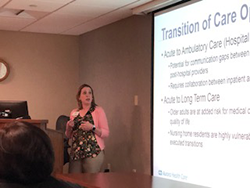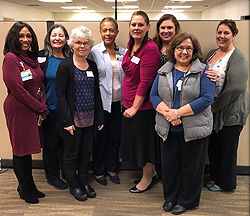Local Networking Groups are a great way to network and join forces with local American Academy of Ambulatory Care Nursing (AAACN) members.
Discuss local issues, share best practices, and establish your own unique goals for your group. LNGs provide education, professional support, and information, and can be a unique way to make a difference at the local level.
Purpose of Local Networking Group (LNG)
 The purpose of an LNG is to provide education, professional support, and information designed to meet the needs of nurses in a variety of ambulatory care settings.
The purpose of an LNG is to provide education, professional support, and information designed to meet the needs of nurses in a variety of ambulatory care settings.
LNGs share information about the benefits of AAACN membership and discuss the available AAACN resources. Additionally, they encourage submission of articles for ViewPoint from the group.
They also coordinate opportunities to promote AAACN membership at regional and local meetings of ambulatory care nurses.
An Informal Networking Group
An Informal group will select a 'chair' (must be a member of AAACN).
The 'chair' serves as the official spokesperson for the Local Networking Group and should keep records of the LNG meetings, and maintain communication with the AAACN National Office about activities.
The group will decide on a schedule or frequency of meetings, as well as the type of meeting which can include educational sessions, networking or listening to and discussion of an audio-conference.
An Formal Networking Group
A Formal group will establish officers for their group.
The officers should include a chairperson, a vice chairperson, a secretary, a treasurer, and a program planner or planners. Depending on the size of the Local Networking Group, these roles may be combined.
The ‘chairperson’ will serve as the spokesperson of the group and maintain communication with the AAACN National Office about the group’s activities.
A formal LNG group should have quarterly business meetings. Business meetings can follow or precede other group activities. Minimally, one major educational offering/program should be scheduled annually.
The LNG will determine the program design and content of this program and registration fees. In most formal or conventional networking groups' non-members are charged a higher registration fee than members.
A Formal LNG needs to apply for individual recognition of exemption from income tax and an employee identification number if it chooses to obtain tax-exempt status.
How to Start a LNG
 To create an LNG, the person who will serve as Chair must be a member of AAACN, and contact the AAACN National Office with the request.
To create an LNG, the person who will serve as Chair must be a member of AAACN, and contact the AAACN National Office with the request.
The Chair serves as the official spokesperson for their LNG and should keep records of meetings and maintain communication with the National Office about activities.
The group decides on the frequency of meetings, as well as the type of meeting, which can include educational sessions, networking events, or listening to and discussion of an audio-conference.
The National Office can provide assistance with inviting members local to the LNG’s location via eblast to upcoming meetings and events, as well as advertising events on the AAACN Website.
Scheduled Meetings/Events
(From the
AAACN Local Networking Groups
If you have questions about the LNGs, or wish information, please contact us.
Houston Area Local Networking Group
Chair: Leslie K. Morris DNP, RN, AMB-BC, NPD-BC
Illinois Ambulatory Nurse Practice Consortium Local Networking Group of AAACN
Chair: Dawn Wimmer
Inland Northwest American Academy of Ambulatory Care Nurses (IN-AAACN) LNG
Coeur d’Alene, ID
Chair: Lori Jackson
Milwaukee Networking Group
Milwaukee, WI
Chair: Kristine Van Hecker, BSN, RN
Northeast Local Networking Group
Open to AAACN members in the Northeast
Chair: Ann Marie Moynihan, MSN, APRN, ONC
Southern Louisiana LNG
Baton Rouge, Louisiana
Chair: Michelle Jeter
